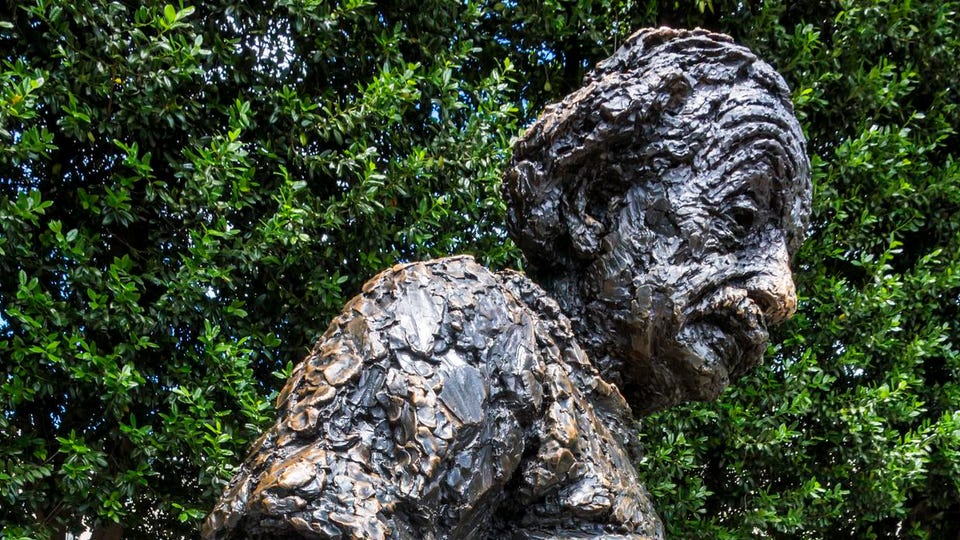Leadership Strategy National Academy Of Sciences: Boost Immigration, Immigrant Scientists Stuart Anderson Senior Contributor Opinions expressed by Forbes Contributors are their own. I write about globalization, business, technology and immigration. Following New! Follow this author to stay notified about their latest stories.
Got it! Oct 18, 2022, 12:09am EDT | New! Click on the conversation bubble to join the conversation Got it! Share to Facebook Share to Twitter Share to Linkedin The National Academy of Sciences (NAS) Albert Einstein Memorial statue. (Photo by: Jeffrey . .
. [+] Greenberg/Universal Images Group via Getty Images) Universal Images Group via Getty Images In a new report , the National Academy of Sciences (NAS) called for protecting U. S.
technological advantages by attracting more foreign-born talent, increasing immigration and taking other measures. The report comes at a time of growing attention to U. S.
wait times and visa shortfalls that have encouraged talented foreign-born students and professionals to seek out other countries . The report, Protecting U. S.
Technological Advantage , notes that U. S. success in science and technology has encouraged other nations to build up their universities, invest more in research and development and attract talent from around the world.
Other countries, particularly China, have seen an increase in their domestic supply of students in science, technology, engineering and math (STEM) fields. The NAS report was published jointly by the National Academies of Sciences, Engineering, and Medicine. A measure of the globalization of science and technology, according to the report, is the increase in international students who have graduated from U.
S. universities since 1980. The panel notes this increase has benefited the U.
S. economy and America’s technological leadership. At U.
S. universities, international students account for 74% of the full-time graduate students in electrical engineering and 72% in computer and information sciences, as well as 50% to 70% in fields that include mathematics and materials sciences, according to a National Foundation for American Policy (NFAP) analysis . MORE FOR YOU Hiring Refugees: How One Big Factory Did It JB Hunt, P&G & Whirlpool: A Look At Some Of The Earnings Coming The Week Of October 17 The 14 Best Boutique Hotels In Tbilisi, Georgia The NAS report cited NFAP research that showed approximately one-third of U.
S. Nobel prizes “in physics, chemistry, and medicine have gone to scientists who immigrated to the United States. ” The National Academy of Sciences report notes America is experiencing problems attracting talent as other countries have stepped up to compete in the global battle for highly skilled people.
“Recent evidence suggests that U. S. immigration policies may be inhibiting the ability of foreign students to found new companies or work in startups,” according to the NAS report.
“Other countries have launched initiatives to recruit talent, including students who have been trained in the United States. While recent U. S.
immigration reforms have allowed foreign students to work longer (through optional practical training) after completing their degrees, the number of temporary work visas [H-1B visas] is capped, even for those occupations in which workers are in high demand. ” While not the report’s sole focus, the National Academy of Sciences several times recommends U. S.
policymakers do whatever is feasible to increase immigration and attract more foreign-born scientists and engineers to the United States. “Internationally, the United States needs to find new and better ways to encourage scientists, engineers, and their families to come to this country to work and live. Options include further aligning work visa levels with student visa levels and clearing pathways to citizenship for top international researchers.
” “Imposing excessive restrictions on foreign talent in research environments benefits U. S. competitors by dissuading talented people from coming to the United States, leading them to find other places to live and work,” according to the NAS report.
The Biden Administration’s approach to attracting foreign-born talent has been the opposite of the Trump administration’s policies. The Trump team engaged in what analysts saw as a virtual and legal war against employers and high-skilled foreign nationals , leading to vastly increased denial rates for skilled work visas— actions judges ruled were unlawful —and a presidential proclamation that prohibited the entry of high-skilled visa holders. The Biden administration’s October 2022 National Security Strategy report states, “We also are doubling down on our longstanding and asymmetric strategic advantage: attracting and retaining the world’s best talent.
Attracting a higher volume of global STEM talent is a priority for our national security and supply chain security, so we will aggressively implement recent visa actions and work with Congress to do more. ” Sen. Charles Grassley (R-IA) stopped the inclusion of an important immigration measure in the CHIPS and Science Act of 2022 , which became law on August 9, 2022.
Grassley blocked an exemption from annual green card limits and backlogs for foreign nationals with a Ph. D. in STEM fields and those with a master’s degree “in a critical industry.
” Efforts to prepare America to maintain (or regain) its edge in technology fields are likely to continue. “In concert with efforts to expand domestic talent, the United States needs to aggressively expand the advantages it offers for international talent, including top academic research universities; open, well-funded, high-reputation, and innovative research environments; a venture-backed, entrepreneurial innovation system; and public–private R&D partnerships,” concludes the National Academy of Sciences report. “China and other countries cannot match these advantages within the constraints of their systems.
” Follow me on Twitter . Check out my website . Stuart Anderson Editorial Standards Print Reprints & Permissions.
From: forbes
URL: https://www.forbes.com/sites/stuartanderson/2022/10/18/national-academy-of-sciences-boost-immigration-immigrant-scientists/



